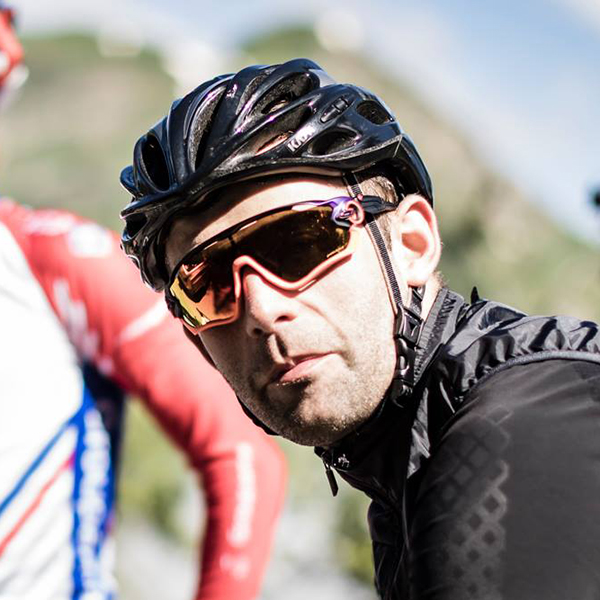A Gravaa KAPS (Kinetic Air Pressure System) automatic tyre inflator system for gravel riding has been spotted at Eurobike 2024.
The system made headlines in 2023 after it was spotted on Dylan van Baarle, Christophe Laporte and Edoardo Affini's Dwar Doors Vlaanderen road race bikes.
Now, Gravaa is working with Reserve and DT Swiss to bring complete gravel wheelsets to market. Loek Luijbregts, Gravaa's chief marketing officer, told BikeRadar an MTB-specific version is also in development, alongside an updated road-going system.
The system has been updated with smaller, sleeker sprint shifter-style controls and a new mobile app.
We’re also told that “at least two” bike brands have bought units from Gravaa, suggesting that the system will appear on OEM bikes in the not-so-distant future.
From trial to realisation

We saw Team Jumbo-Visma (now Visma Lease-a-Bike) rider Edoardo Affini sporting a prototype Gravaa KAPS hub at the 2023 Dwars Door Vlaanderen spring classics race.
This enabled Affini to adjust his tyre pressures on the move, via remote switches on the handlebar.
In theory, reducing pressures on rougher terrain – for example, up cobbled climbs or rougher roads – could increase traction and minimise fatigue. Increasing tyre pressure for tarmac sections of the course would reduce rolling resistance.
The system works using a clutch mechanism housed within the Gravaa hub.
With the clutch engaged, the system pumps up the tyre using the rotational movement of the hub via a tube attached to the spokes.

When the clutch is disengaged, Gravaa says the system adds “zero” watts of friction. In theory, the only penalty will be the weight of the system fitted to the bike.
Now spotted at Eurobike 2024 rigged up to a Reserve 40/44 gravel wheelset fitted with 700 x 38c Vittoria Terreno Dry gravel tyres, Gravaa says it's been hard at work to develop a system for gravel.
Luijbregts said the gravel version of the KAPS system can inflate a gravel tyre by “around 1.2 BAR / 17.5 PSI per kilometre of riding”, although the specific test conditions (such as tyre size) weren’t confirmed.

According to testing, Luijbregts claims riders “pay a 2-5 watt penalty as the system engages [to inflate the tyre]”.
Over a 200-mile gravel course (such as Unbound), Gravaa claims a 72kg rider could see a 21w normalised power benefit, and finish 28 minutes faster having carried out an estimated 80-100 tyre pressure changes en route.
The system we have spy shots of isn’t the finished article. We’re told that the system consumers will receive will look “very similar”, but carry a few changes to help optimise the design.
What’s changing?

The previous system’s hub used seven bolts to mount a disc rotor. The new version is set to use five to save internal space inside the hub.
Gravaa says consumer units will also have potted electronics inside, whereby the electronics are set into an epoxy resin. This, it’s claimed, will improve protection from moisture, dust and temperature fluctuations.

Affini used prototype remote controls when he tested the system 2023. Production models will use Classified shifters, the brand behind the Powershift hub system.
Luijbregts also says that Gravaa has been hard at work developing a new app for the KAPS device, designed to make setup easier and to provide greater customisation of the inflation and deflation intervals.
Luijbregts suggested high-level and professional riders may prefer to set up the system with smaller jumps in pressure, while others may benefit from larger intervals.

A new valve interface with a hydrophobic filter has also been developed – something Gravaa admits couldn’t be achieved without calling in specific expertise.
The patented design uses a hydrophobic seal which allows air in and out, but keeps sealant in the tyre and prevents it from congealing around the inlet or entering the Gravaa system.
Connectivity is also set to spread to Garmin and Wahoo bike computers, opening the theoretical possibility of GPS-driven automatic tyre pressure adjustment – although Gravaa says that’s not on the cards for now, describing it as an “unfair advantage”, presumably given the UCI’s regulations governing rider controls.
Availability in 2024 and 2025

While exact timings are unclear, Gravaa says its system is set to be available later in 2024. A road version (like the one Affini tested) should come to market in early 2025.
When the gravel system launches, we’re told that DT Swiss and Reserve will be the lead partners, supplying rims to the brand.
Reserve wheelsets with the system are set to cost around €3,800, while the DT Swiss wheelset is likely to cost in the region of €4,300.
There’s no word on how much complete bikes with KAPS will cost, but we were informed they would be towards the top end of price ranges.
